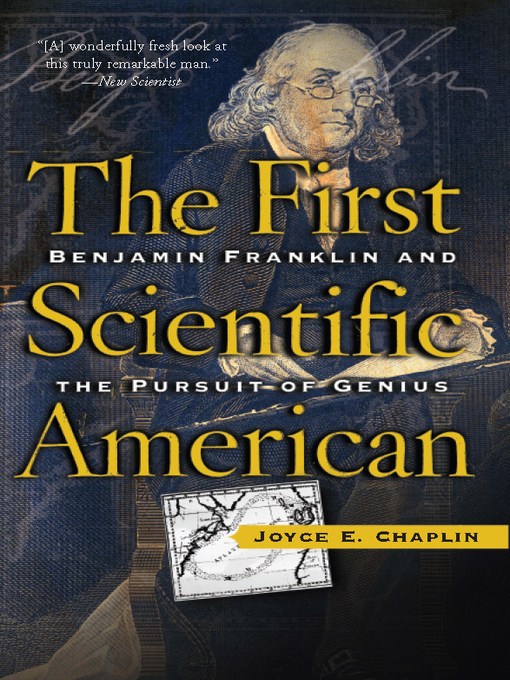-
Creators
-
Publisher
-
Release date
August 2, 2007 -
Formats
-
Kindle Book
-
OverDrive Read
- ISBN: 9780465008858
-
EPUB ebook
- ISBN: 9780465008858
- File size: 6131 KB
-
-
Languages
- English
-
Reviews
-
Publisher's Weekly
February 13, 2006
Is there room for yet another Franklin biography on already crowded shelves? Chaplin, a Harvard historian of science, keeps the subject fresh by narrowing her focus almost exclusively to Franklin's scientific career. It was the pursuit of "natural philosophy," including his early experiments on the properties of electricity, that made Franklin a celebrity in Europe, and Chaplin shows how he crafted his public image as a scientist to transform himself from a humble colonial tradesman into a sophisticated gentleman of letters. In her estimation, Franklin's forays into politics on behalf of the American colonies prevented him from pursuing further research that might have led to discoveries as revolutionary as those of Isaac Newton. She's careful, though, to point out that much of Franklin's science would be unrecognizable as such to us today; he was a proponent, for example, of the "argument from design" that underpins modern creationism. If you've read any of the other Franklin bios, Chaplin won't radically alter your perspective, but for those with only vague notions about his role as a founding father and particularly his importance as a scientist, her emphasis can be eye-opening. -
Library Journal
April 15, 2006
Founding Father Benjamin Franklin's scientific genius, so often ignored today, gave him access to the corridors of diplomacy for which he is now renowned. Chaplin (history, Harvard Univ.; " An Anxious Pursuit: Agricultural Innovation and Modernity in the Lower South, 1730 -1815") notes that Franklin was the first person to become an international celebrity because of his work in the physical sciences (Albert Einstein was similarly lionized some 250 years later). In describing Franklin's scientific path, Chaplin, who has previously published scholarly works on science and technology in Colonial North America, captures the impact of Franklin's gifts on the development of his country's intellectual infrastructure. Franklin's knowledge, social and observational skills, and energy enabled him to complete projects ranging from the charting of the Gulf Stream current to the invention of a currency that resisted counterfeiting to the unveiling of the nature of electricity. This is a well-written, extensively footnoted, and finely illustrated biography. Because of the focus on Franklin's scientific life, it will add a new perspective to the body of myths that surrounds the great man in this tercentennial year of his birth. Recommended for all public and academic libraries." -Sara Rutter, Univ. of Hawaii at Manoa Lib., Honolulu"Copyright 2006 Library Journal, LLC Used with permission.
-
Booklist
April 15, 2006
In this tercentenary year of Franklin's birth, Harvard University historian Chaplin places Franklin within the transatlantic society of Enlightenment science. It was in this milieu that Franklin achieved international renown, which, Chaplin argues, Franklin's role as Founder has overwhelmed. To rectify this, she has thoroughly researched Franklin's scientific writings and communications with fellow experimenters, including a scene of 20-year-old Franklin importuning London's Royal Society with his observations about asbestos. But entry to the socially rarified club--science then was a pursuit of gentlemen of means--had to wait upon Franklin's making his fortune. Describing that achievement, Chaplin then plunges into the domains of science that attracted Franklin in his forties and fifties. Beyond the specifics of electricity, the Gulf Stream, and much else, Chaplin develops Franklin's philosophical attitudes toward nature as well as the suspensions of his scientific activity by the demands of revolution and diplomacy. An approachable portrait, Chaplin's scientific Franklin rounds out the more homespun image of popular conception.(Reprinted with permission of Booklist, copyright 2006, American Library Association.)
-
Loading
Why is availability limited?
×Availability can change throughout the month based on the library's budget. You can still place a hold on the title, and your hold will be automatically filled as soon as the title is available again.
The Kindle Book format for this title is not supported on:
×Read-along ebook
×The OverDrive Read format of this ebook has professional narration that plays while you read in your browser. Learn more here.



